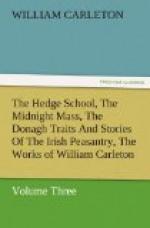“In Classics—Grammar, Cordery, AEsop’s Fables, Erasmus’ Colloquies, Cornelius Nepos, Phaedrus, Valerius Maximus, Justin, Ovid, Sallust, Virgil, Horace, Juvenal, Persius, Terence, Tully’s Offices, Cicero, Manouverius Turgidus, Esculapius, Rogerius, Satanus Nigrus, Quinctilian, Livy, Thomas Aquinas, Cornelius Agrippa, and Cholera Morbus.
“Greek Grammar, Greek Testament, Lucian, Homer, Sophocles, AEschylus, Thucydides, Aristophanes, Xenophon, Plato, Aristotle, Socrates, and the Works of Alexander the Great; the manners, habits, customs, usages, and the meditations of the Grecians; the Greek Digamma resolved, Prosody, Composition, both in prose and verse, and Oratory, in English, Latin and Greek; together with various other branches of learning and scholastic profundity—quoi enumerare longum est—along with Irish Radically, and a small taste of Hebrew upon the Masoretic text.
“Matthew Kavanagh, Philomath.” (* See note at the end of this sketch.)
Having posted this document upon the hapel-door, and in all the public places and cross roads of the parish, Mat considered himself as having done his duty. He now began to teach, and his school continued to increase to his heart’s content, every day bringing him fresh scholars. In this manner he flourished till the beginning of winter, when those boys, who, by the poverty of their parents, had been compelled to go to service to the neighboring farmers, flocked to him in numbers, quite voracious for knowledge. An addition was consequently built to the school-house, which was considerably too small; so that, as Christmas approached, it would be difficult to find a more numerous or merry establishment under the roof of a hedge school. But it is time to give an account of its interior.
The reader will then be pleased to picture to himself such a house as I have already described—in a line with the hedge; the eave of the back roof within a foot of the ground behind it; a large hole exactly in the middle of the “riggin’,” as a chimney; immediately under which is an excavation in the floor, burned away by a large fire of turf, loosely heaped together. This is surrounded by a circle of urchins, sitting on the bare earth, stones, and hassocks, and exhibiting a series of speckled shins, all radiating towards the fire, like sausages on a Poloni dish. There they are—wedged as close as they can sit; one with half a thigh off his breeches—another with half an arm off his tattered coat—a third without breeches at all, wearing, as a substitute, a piece of his mother’s old petticoat, pinned about his loins—a fourth, no coat—a fifth, with a cap on him, because he has got a scald, from having sat under the juice of fresh hung bacon—a sixth with a black eye—a seventh two rags about his heels to keep his kibes clean—an eighth crying to get home, because he has got a headache, though it may be as well to hint, that there is a drag-hunt to start from beside his father’s




